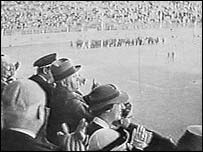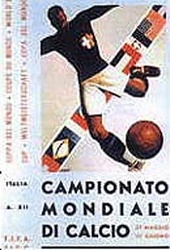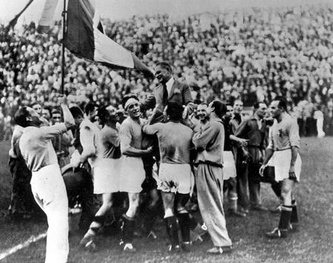Soccer: the new Religion
http://news.bbc.co.uk/2/hi/uk_news/magazine/3128202.stm http://www.cbc.ca/sports/worldcup2006/history/events/1934.html http://www.bestworldcup.net/
MUSSOLINI: NATIONALISM FOR THE WORLD TO SEE
The 1934 World Cup brought the idea of nationalism to the forefront. As the host country and at the brink of World War II, Fascist Italy was blessed with the rare opportunity of demonstrating its strength and success as a political regime to the world. For Benito Mussolini, it was an opportunity to reveal much more than simply athletic ability. As Achille Starace, an Italian official at the time, said, "the attention of the world of sport will turn itself on Italy... this official [continues] to stress the opportunity to demonstrate the regime's entire range of skills by organizing a tournament [of this magnitude]" (Martin 183-184).
Realizing the chance presented before him, Mussolini set to establish fascism as a prevalent global presence. In order to accomplish this, a significant amount of propaganda was immediately incorporated. Match tickets were printed with elegant Italian designs and very prominent symbols in the hope that foreign soccer enthusiasts would cherish the memorabilia. In addition, several thousand posters were designed with fascist icons and served as constant reminders of the upcoming World Cup.
Mussolini envisioned the soccer championship serving as a national podium for fascist pride. Although he demanded victory from the national team, he realized that emphasizing the power of his regime would be the most critical goal to achieve. That being the case, the World Cup quickly became the foundation of nationalistic appeal and fascist popularity within Italy. Mussolini gained the support of his fellow countrymen through the diplomatic relations that he developed. The most evident examples were from Brazil and Argentina. The Brazilian Federation appointed a well-renowned Fascist journalist and reporter to head the squad. They utilized this as a way to please the host nation and strengthen the ties between the two governments. The Argentines paid significant homage to Mussolini and his fascist government by visiting his birth village of Predappio and the tomb of Mussolini's family. Actions such as these served to ignite nationalistic support and even worship for the fascist government. It revealed the international prestige that Mussolini's regime was gaining around the globe (Martin 187).
In this setting, soccer was utilized very clearly as a means by which to instill pride and faith into the hearts of the Italian public. In doing so, the sport reinforced the influence of the fascist government by serving as the ultimate civil religion. Throughout the matches, thunderous chants of "Duce, Duce" (title referring to Mussolini) were cried out by thousands upon thousands of supporters while the Italian militia band played a selection of Fascist hymns (Martin 189). According to one observer, it was "more like a Fascist rally than a sporting contest" (Martin 189). With the eventual championship being won by the Italian team, Mussolini and his nationalistic goal of creating undeniable dedication to the fascist regime was fulfilled. The civil religion was formed and soccer was the vehicle by which he founded it on. "Forza Italia" was finally a cry heard by the whole world.
Realizing the chance presented before him, Mussolini set to establish fascism as a prevalent global presence. In order to accomplish this, a significant amount of propaganda was immediately incorporated. Match tickets were printed with elegant Italian designs and very prominent symbols in the hope that foreign soccer enthusiasts would cherish the memorabilia. In addition, several thousand posters were designed with fascist icons and served as constant reminders of the upcoming World Cup.
Mussolini envisioned the soccer championship serving as a national podium for fascist pride. Although he demanded victory from the national team, he realized that emphasizing the power of his regime would be the most critical goal to achieve. That being the case, the World Cup quickly became the foundation of nationalistic appeal and fascist popularity within Italy. Mussolini gained the support of his fellow countrymen through the diplomatic relations that he developed. The most evident examples were from Brazil and Argentina. The Brazilian Federation appointed a well-renowned Fascist journalist and reporter to head the squad. They utilized this as a way to please the host nation and strengthen the ties between the two governments. The Argentines paid significant homage to Mussolini and his fascist government by visiting his birth village of Predappio and the tomb of Mussolini's family. Actions such as these served to ignite nationalistic support and even worship for the fascist government. It revealed the international prestige that Mussolini's regime was gaining around the globe (Martin 187).
In this setting, soccer was utilized very clearly as a means by which to instill pride and faith into the hearts of the Italian public. In doing so, the sport reinforced the influence of the fascist government by serving as the ultimate civil religion. Throughout the matches, thunderous chants of "Duce, Duce" (title referring to Mussolini) were cried out by thousands upon thousands of supporters while the Italian militia band played a selection of Fascist hymns (Martin 189). According to one observer, it was "more like a Fascist rally than a sporting contest" (Martin 189). With the eventual championship being won by the Italian team, Mussolini and his nationalistic goal of creating undeniable dedication to the fascist regime was fulfilled. The civil religion was formed and soccer was the vehicle by which he founded it on. "Forza Italia" was finally a cry heard by the whole world.



